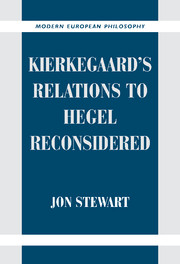Book contents
- Frontmatter
- Contents
- Acknowledgements
- Abbreviations of Primary Texts
- Preface
- Introduction
- 1 Kierkegaard and Danish Hegelianism
- 2 Traces of Hegel in From the Papers of One Still Living and the Early Works
- 3 The Ironic Thesis and Hegel's Presence in The Concept of Irony
- 4 Hegel's Aufhebung and Kierkegaard's Either/Or
- 5 Kierkegaard's Polemic with Martensen in Johannes Climacus, or De omnibus dubitandum est
- 6 Kierkegaard's Repetition and Hegel's Dialectical Mediation
- 7 Hegel's View of Moral Conscience and Kierkegaard's Interpretation of Abraham
- 8 Martensen's Doctrine of Immanence and Kierkegaard's Transcendence in the Philosophical Fragments
- 9 The Dispute with Adler in The Concept of Anxiety
- 10 The Polemic with Heiberg in Prefaces
- 11 Subjective and Objective Thinking: Hegel in the Concluding Unscientific Postscript
- 12 Adler's Confusions and the Results of Hegel's Philosophy
- 13 Kierkegaard's Phenomenology of Despair in The Sickness unto Death
- 14 Kierkegaard and the Development of Nineteenth-Century Continental Philosophy: Conclusions, Reflections, and Reevaluations
- Foreign Language Summaries
- Bibliographies
- Subject Index
- Index of Persons
7 - Hegel's View of Moral Conscience and Kierkegaard's Interpretation of Abraham
Published online by Cambridge University Press: 13 March 2010
- Frontmatter
- Contents
- Acknowledgements
- Abbreviations of Primary Texts
- Preface
- Introduction
- 1 Kierkegaard and Danish Hegelianism
- 2 Traces of Hegel in From the Papers of One Still Living and the Early Works
- 3 The Ironic Thesis and Hegel's Presence in The Concept of Irony
- 4 Hegel's Aufhebung and Kierkegaard's Either/Or
- 5 Kierkegaard's Polemic with Martensen in Johannes Climacus, or De omnibus dubitandum est
- 6 Kierkegaard's Repetition and Hegel's Dialectical Mediation
- 7 Hegel's View of Moral Conscience and Kierkegaard's Interpretation of Abraham
- 8 Martensen's Doctrine of Immanence and Kierkegaard's Transcendence in the Philosophical Fragments
- 9 The Dispute with Adler in The Concept of Anxiety
- 10 The Polemic with Heiberg in Prefaces
- 11 Subjective and Objective Thinking: Hegel in the Concluding Unscientific Postscript
- 12 Adler's Confusions and the Results of Hegel's Philosophy
- 13 Kierkegaard's Phenomenology of Despair in The Sickness unto Death
- 14 Kierkegaard and the Development of Nineteenth-Century Continental Philosophy: Conclusions, Reflections, and Reevaluations
- Foreign Language Summaries
- Bibliographies
- Subject Index
- Index of Persons
Summary
As has been noted previously, Fear and Trembling appeared together with Repetition and Three Edifying Discourses on October 16, 1843. It contains some of Kierkegaard's best-known concepts, such as the knight of faith, the paradox, the leap, and the absurd. Here Kierkegaard under the pseudonym, Johannes de silentio, gives his rich analysis of the Abraham and Isaac story to illustrate these and other concepts. In a series of three “Problemata,” he discusses the conundrums raised in the story by Abraham's reaction to the divine command to sacrifice his only son. The first “Problema” treats what is referred to as “the teleological suspension of the ethical.” Here the claim is set forth that the usual ethical duties and obligations can be “suspended” by a divine command. In the second “Problema,” Johannes de silentio argues that there is an absolute duty towards God which renders one's other duties finite and relative. Finally, in the third “Problema,” the problem of communication is discussed; given the private nature of the divine command, it was, according to Johannes de silentio, impossible for Abraham to explain his actions to others.
Hegel's role in this text is significant. Although Kierkegaard usually has his pseudonyms employ expressions such as “a Hegelian,” or “recent philosophy,” Johannes de silentio uncharacteristically refers to Hegel directly in several passages. His anti-Hegel polemics were noted by two anonymous contemporary reviewers of Fear and Trembling.
- Type
- Chapter
- Information
- Kierkegaard's Relations to Hegel Reconsidered , pp. 305 - 335Publisher: Cambridge University PressPrint publication year: 2003

